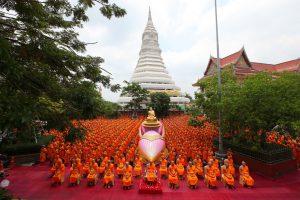According to the most recent Thai census, approximately 85% of

Thais are adherents to Buddhism – Theravada Buddhism to be precise – which is has elements of both philosophy and religion.
The key precepts of Thai Buddhism are the belief that each of us will be repeatedly reincarnated until we achieve enlightenment, and the belief that by doing good works (“making merit”) a person’s next incarnation will be more favorable for achieving enlightenment. A corollary belief is that a person who makes insufficient merit to atone for his or her misdeeds will be reincarnated as a downtrodden person, or even as a lowly animal.
Buddhist monks and nuns have dedicated their lives to becoming enlightened and helping others. They do this by following the edicts of “Dhamma”, a prescription for dealing justly and compassionately with others, and for meditating. Monks and nuns are considered sacred souls and are afforded the utmost respect.
Thais do not consider men to be mature adults until they have spent time as monks. Customarily young Thais do this during three-month Buddhist “Rain Retreat”, called phansa, which starts in July. During this period no-one is allowed to leave the monkhood. Often these days youngsters enter the monkhood for only a few weeks, but they must not do this during the Rain Retreat.
Thai people use the expression “unripe” for those men who have not yet spent their time in monkhood. After men have been a monk and left the monkhood, they are “thit”.
During phansa novice monks follow the 10 precepts;
1. Refrain from killing living things.
2. Refrain from stealing.
3. Refrain from un-chastity (sensuality, sexuality, lust).
4. Refrain from lying.
5. Refrain from taking intoxicants.
6. Refrain from taking food at inappropriate times (after noon).
7. Refrain from singing, dancing, playing music or attending entertainment programs.
8. Refrain from wearing perfume, cosmetics and garland (decorative accessories).
9. Refrain from sitting on high chairs and from sleeping on luxurious, soft beds.
10. Refrain from accepting money.
Both monks and nuns shave their heads. Ordained monks wear flowing saffron (orange) robes and nuns wear white ones. Monks and nuns rise at 4:00am to chant and meditate, and then at sunrise go out to beg for their daily food. Devout Buddhist lay people generously provide monks and nuns with plates of food – thereby making merit.
There are a number of festivals and ceremonies throughout the year at which lay people can earn merit – usually by donating money to the local temple (wat) or doing good works. Notable events for Buddhists are the annual ordination of novices into the priesthood, and the annual ceremony when monks receive new robes.
In Thai society people who have achieved success are generally considered to have been rewarded for making substantial merit in their previous and current lives, and are therefore afforded high respect. At the very top of this stratified society is the king, who practices dhammaraja, a set of disciplined precepts which empower the monarch to rule wisely and fairly.
You can expect successful Thais comport themselves with dignity and respect for others, and for them to take seriously opportunities for making merit. By doing so, they ensure their next incarnation will be graced with success and a blessed life.